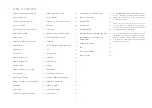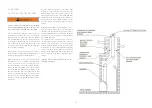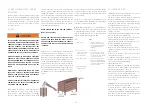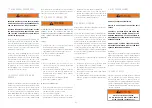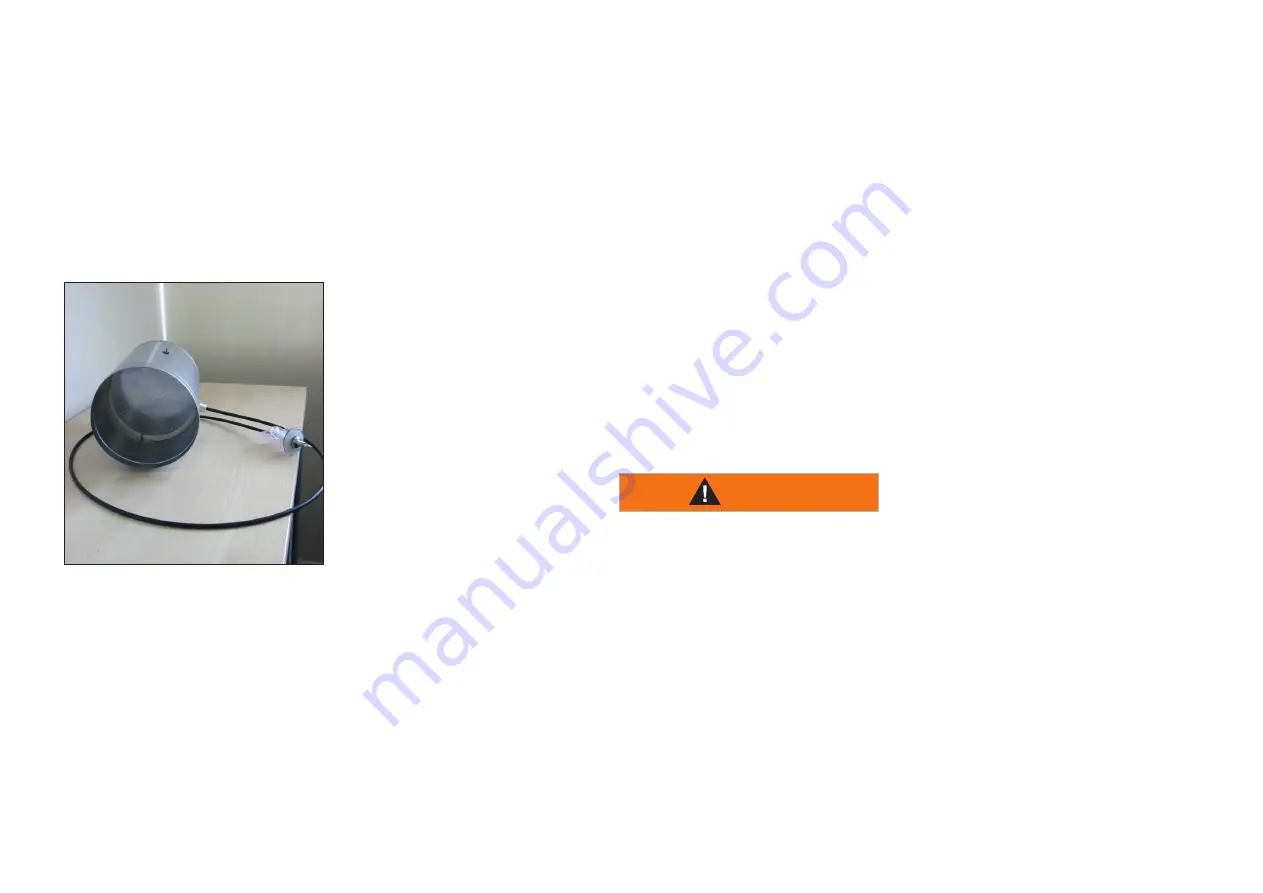
10
CLOSURE VALVE
If you decide to connect separate combustion air it is
mandatory to install a closure valve to prevent conden-
sate formation and to prevent the room from becoming
cold while the stove is not in use. It should ideally be
located as close as possible to the outside wall. It can
be controlled from inside if it is not too far from the
stove (cable length = 47”).
PLEASE NOTE: COMBUSTION AIR INTAKE REQUIREMENTS.
It is recommended that the 5” Combustion air intake
duct is installed in acorrect manner.
Please find the following information. Outside Air-
ducts must… - Be protected on the outside by a grill
where the free passage section of these grills is at
least equivalent to the section of the air inlet.
Please note that the infiltration of wind, weather, snow
and water can effect or damage the air combustion
system.
- Ideally be fitted with a butterfly valve so that it can
manually , be used to close the cold air from entering
the firebox.
Please note that the butterfly valve has to be 100%
open or 100% closed and should not be used to adjust
burn rate!
Try to keep the butterfly valve as close to the outside
wall as possible.
-The air-duct should be insulated and the distance
from the wood insert to the outside should be as short
as possible.
For 5” air duct please refer to the maximum lengths
and elbows
Number of 90 degree elbows
4’ = 4 elbows
8’ = 4 elbows
10’ = 2 elbows
12’ = 0 elbow
If you exceed these guidelines, you must compensate
by using a larger diameter and/or a smoother duct.
Careful not to crush the duct!
It should ideally be located as close as possible to the
outside wall.
-If it is not possible to bring in combustion air to the
wood insert please insure that there is sufficient air
to feed the wood insert in the room –please note that
this is not ideal.
Please contact your dealer who offers suitable parts
for air inlet ducts (pipes and damper).
Make sure that the wire mesh is mounted at the com-
bustion air inlet.
3. INSTALLATION PLANNING
Clean all ashes out of the inside of the existing wood
insert opening. Make sure
that the chimney and wood insert are free of cracks,
loose mortar, creosote
deposits, blockage or other signs of deterioration. If
necessary, have any
repair work done by a qualified professional before
installing the insert.
Do NOT remove bricks or mortar from the wood insert.
In case of an outside
air inlet or ash dump, fill with rockwool insulation.
Adhere to minimum
clearances as illustrated.
WARNING
WEAR GLOVES AND SAFETY GLASSES FOR PROTEC-
TION. CAREFULLY FOLLOW THE INSTRUCTIONS FOR
ASSEMBLY OF THE PIPE AND OTHER PARTS NEEDED
TO INSTALL THE APPLIANCE. FAILURE TO DO SO MAY
RESULT IN A FIRE, ESPECIALLY IF COMBUSTIBLES ARE
TOO CLOSE TO THE APPLIANCE OR CHIMNEY AND AIR
SPACES ARE BLOCKED, PREVENTING THE FREE MOVE-
MENT OF COOLING AIR. DO NOT DRAW OUTSIDE AIR
FROM GARAGE SPACES. EXHAUST PRODUCTS OF GAS-
OLINE ENGINES ARE HAZARDOUS. DO NOT INSTALL
OUTSIDE AIR DUCTS SUCH THAT THE AIR MAY BE
DRAWN FROM ATTIC SPACES, BASEMENTS OR ABOVE
THE ROOFING WHERE OTHER HEATING APPLIANCES
OR FANS AND CHIMNEYS EXHAUST UTILIZE AIR. THESE
PRECAUTIONS WILL REDUCE THE POSSIBILITY OF
APPLIANCE SMOKING OR AIR FLOW REVERSAL. THE
OUTSIDE AIR INLET MUST REMAIN CLEAR OF LEAVES,
DEBRIS ICE AND/OR SNOW OR ANY OTHER OBSTA-
CLES. IT MUST BE UNRESTRICTED WHILE APPLIANCE
IS IN USE TO PREVENT ROOM AIR STARVATION WHICH
CAN CAUSE SMOKE SPILLAGE AND AN INABILITY TO
MAINTAIN A FIRE. SMOKE SPILLAGE CAN ALSO SET
OFF SMOKE ALARMS. NEGATIVE PRESSURE WITHIN
YOUR HOME MAY INADVERTENTLY AFFECT YOUR
APPLIANCE. TO PREVENT CONTACT WITH SAGGING
OR LOOSE INSULATION, THE APPLIANCE MUST NOT BE
INSTALLED AGAINST VAPOUR BARRIERS OR EXPOSED
INSULATION. LOCALIZED OVERHEATING COULD OCCUR
AND A FIRE COULD RESULT. DO NOT USE MAKESHIFT
COMPROMISES DURING INSTALLATION. DO NOT
BLOCK OR RESTRICT AIR, GRILLE OR LOUVRE OPEN-
INGS. DO NOT ADD A HOOD. KEEP HAND TOOLS IN
GOOD CONDITION; SHARPEN CUTTING EDGES AND
MAKE SURE TOOL HANDLES ARE SECURE. ALWAYS
MAINTAIN THE MINIMUM AIR SPACE REQUIRED TO
THE ENCLOSURE TO PREVENT FIRES. DO NOT PACK
REQUIRED AIR SPACES WITH INSULATION OR OTHER
MATERIALS. COMBUSTION AIR INLET DUCTS ARE NOT
TO TERMINATE IN ATTIC SPACES OR CRAWL SPACES.
3.1 MINIMUM CLEARANCES TO
COMBUSTIBLES
DO NOT PLACE ANY COMBUSTIBLE MATERIALS (FUR-
NITURE, FIREWOOD, ETC.) WITHIN 48”(1220mm) IN
FRONT AND ON THE SIDES OF THE Insert.
COMBUSTIBLE MATERIALS CAN NOT PROTRUDE ONTO
THE METAL PARTS OF THE UNIT, THEY MUST BE COV-
ERED WITH NON COMBUSTIBLE MATERIALS.
Summary of Contents for Insert-600
Page 26: ...26 10 6 FOR YOUR INFORMATION...



